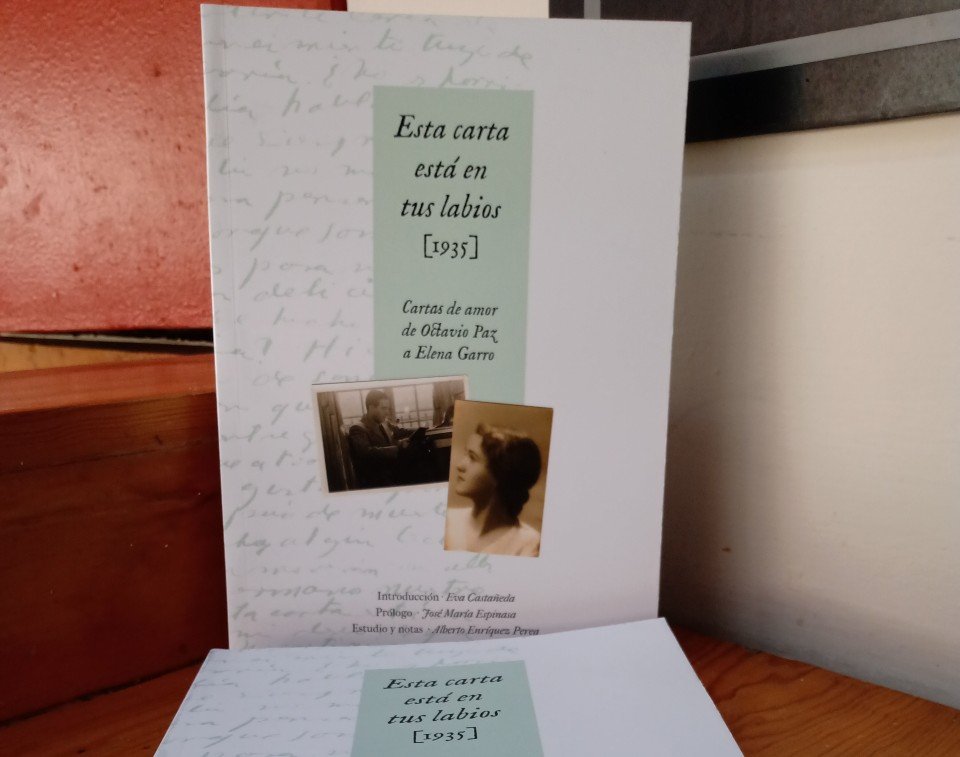This letter is on your lips (1935), is the title of a singular book that shows the images of some of the letters sent by the young Octavio Paz to whom he would later become his first wife, Elena Garro. His literary and philosophical obsessions are mixed with declarations of love that testify to a relationship told by the Mexican writer from the epistle. Dated between June and October 1935, the letters reflect part of the daily life of Mexico City at that time, in addition to the love theme being the most relevant in this correspondence, in which other aspects are filtered, such as filial love, love as pedagogy and love as a dental sign.
This is what the writer, literary critic and professor Eva Castañeda points out, who in the prologue of the book also highlights the exalted and impetuous tone of many of the letters, since they were written by a very young Paz, who was only 21 years old: « …although in many moments he maintains a measured and almost rational position regarding various love events, it is also true that in others, the most, emotion, outburst and desperation win. In addition to the above, I consider that these letters must be interpreted in the light of the time in which they were written; the 1930s is still a time when women remained subject to a series of social conventions in which men dominated practically all spheres of public life, so the masculine vision of love will be the prototypical one».
In these letters, the budding writer and the origins of future poems are glimpsed. It is true that Garro’s responses are strange (they are not yet known), but in this volume we approach a Paz, “… young aspiring poet who thinks and experiences love with an excessive capital letter.” These last words from the essayist José María Espinasa, author of the introduction to this title that bears the seal of Ediciones del Lirio and the Meritorious University of Puebla (BUAP). The beautiful volume is completed with a “Study and notes on love letters”, carried out by Dr. Alberto Enríquez Perea; and a Hemerobibliografía, which precede the images of the letters reproduced in the book, belonging to the Elena Garro Archive. Finally, there is a selection of photographs and the transcript of the letters.
Among so much literature that recently flooded Havana, headquarters of the 30. international Book FairFinding this title about the Nobel Prize for Literature comforts those of us who follow the work of one of the most important intellectuals of the Mexican 20th century. Somehow, with this volume, Octavio Paz has been in Cuba and that is also reason for gratitude, since he is not one of the most promoted authors on the Island. One of his scholars, Dr. Rafael Acosta de Arriba, revered him in the context of the Fair, a few days before the two presentations of This letter is on your lips (1935), which took place on April 29, at the San Gerónimo University College in Havana, and April 30 at the headquarters of the Union of Writers and Artists of Cuba.
In a conference at the Casa del Benemérito de las Américas “Benito Juárez”, held on Friday, April 22, the Cuban essayist recalled a panel on the figure and work of Octavio Paz, held at the 2012 Book Fair. « It was truly a kind of rarity in the midst of the heavy silence that surrounds Paz in our country. Something really unfair and out of all cultural logic. There have been very few occasions on which a panel or a conference has been dedicated to him, and he has not been published, the media do not talk about him or his work, it is as if he did not exist». De Paz has only published a book in Cuba about his work, The Mutant Signs of the Labyrinthby Acosta de Arriba himself and published by the Juan Marinello Institute in 2010. Three years later the multiple valuationwith the seal of Casa de las Américas.
The talk given by Acosta de Arriba, in this 30th edition of the Book Fair, dedicated to Mexico, was related to Paz’s art criticism, probably the least analyzed area of his writing. For the Mexican writer, the exercise of criticism always meant an ethical position; a difficult and committed exercise, which was an exciting intellectual challenge. The Cuban intellectual highlighted Paz’s essayistic intervention in relation to the visual arts, both those of his country and the universal ones, and his analysis of the work of the great French artist Marcel Duchamp. It is worth noting that the Mexican was never and was aware of it, neither theoretician nor art historian strict sense. «His attempt to think about artistic themes was therefore based on the critical poetic thought that assisted him, on his infinite curiosity and on the effective tool of the hybridity of the essay. But, also, in a certainty: all the arts flow from the common source that Paz himself called “the poetic instant”».
Acosta de Arriba reviewed in that presentation the art criticism developed in Latin American letters with Luis Cardoza y Aragón, José Lezama Lima and Octavio Paz. While highlighting the staunch judgments of the Mexican poet on the subject of the market, “the conversion of art into merchandise and the unstoppable commercial logic that has completely engulfed the universe of art, a market where symbolic consumer goods are being offered to the highest bidder.
Of the communicating vessels that Paz established between western and eastern culture, between pre-Hispanic and modern Mexico, between romanticism and contemporaneity, and how many zones of knowledge, which were multiple, he knew how to connect with his lucid essays; The Cuban intellectual spoke in this talk that, together with the presentation of the book This letter is on your lips (1935)have brought to Havana the universal spirit of Octavio Paz.















